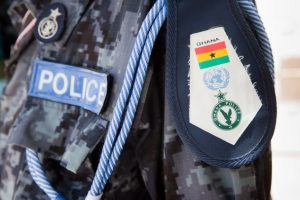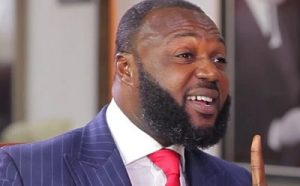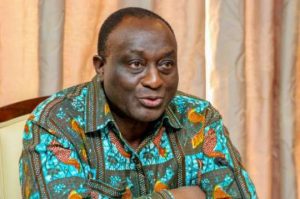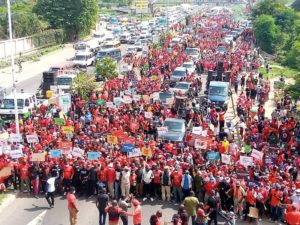Bawku has slid back into conflict again after a few years of peace or the semblance of it. Scores have died; dozens have fled or have been injured with several properties torched and destroyed in a new wave of inter-ethno-political violence that has hit the North Eastern part of Ghana in the turn of the new year.
The municipality tucked in the uppermost region of the North Eastern part of Ghana with a population of about 122,641 (Ghana Statistical Service, 2020) is now under curfew again. Schools have shut down, hospitals closed; economic activities grounded to a halt, thus worsening the strangling cost of living triggered largely by the COVID-19 pandemic and the Russian-Ukraine war.
Tens of suspects were arrested shortly after the December 27, 2021 shooting incidents between the Mamprusis and Kusasis, which marked the return to violence and a struggle over allodial rights, power and influence in Bawku.
“The situation is dire and precarious in Bawku,” Mohammed Tahiru Nambe, a Lawyer and Mamprusi member of the Bawku Inter-Ethnic Peace Committee, captured the present Bawku situation during a conversation with DUBAWA.
“Where is our future if our kids cannot go to school because the schools have been shut down? Even our health situation has worsened and our people die from common malaria because the hospitals too have been closed down,” Nambe added.
His counterpart, Maxwell Agbambilla, also a Lawyer and legal advisor to the Bawku Naba told DUBAWA the current situation in Bawku is “unfortunate.” He adds: “We are impoverishing ourselves all the more with the continued violence. It is an uneasy calm but not the type of calmness we want. People are still agitating on social media. The residents cannot go to work and school children cannot go to school.”
A journalist and Upper East Region correspondent for the Multimedia Group Albert Sore, tells DUBAWA: “It is difficult to tell what the real situation is. One moment it is calm. The next moment, gunshots. So I guess the real situation is calm in a tense atmosphere.”
Conflict from the past
Soldiers maintaining peace in Bawku Source: gbcghanaonline.com
If there is an uneasy calm in Bawku now, I dare say such has been the situation for many years. In his lucid research, “The Kusasi-Mamprusi Conflict in Bawku: A Legacy of British Colonial Policy in Northern Ghana, Felix Y.T. Longi chronicled how the indirect rule system adopted by the colonial administration left in its wake decades of bloody ethnic conflicts between Kusasis who are the indegenous people in Bawku and are in the majority and the Mamprusis who settled in Bawku and are believed to be more powerful. Before that though, in 1931, the Kusasis, according to Awedoba (2009), had come under the authority of Bawku Naba who was then a Mamprusi. However, with time, the Kusasis believed the Mamprusi Bawku Naba and his sub-chiefs had been imposed on them by the colonial administrative authority and, therefore, felt the need for their own independence. Maxwell Agbambilla said the Kusasis “suffered the indignities of colonialism” and therefore started agitating for their own kind of freedom. As Ghana fought and won independence from the British colonial masters in 1957, so did the Kusasis fight for their own kind of independence from the Mamprusis in the same year, Agbambilla recounted. The Kusasis appointed their own Bawku Naba, Naba Abugrago Azoka, (Bombande, 2007) and that appeared to be the genesis of the Bawku conflict. “Disruption ensued immediately in 1957 over the situation of having two people as Bawku Naba, which “led to some disturbances and intensified the claim over” the chieftaincy by the Kusasi and Mamprusi people (Bukari, 2013a: 30).
While the remote cause of this conflict is deeply rooted in the colonial vestiges, a toxic mix of partisan politics has made a bad situation rather worse. In a bid to protect their interest, power and influence, the factions aligned themselves with powerful political parties. As far back as the first Republic under Dr Kwame Nkrumah, Longi stated that the Kusasis aligned themselves with the Convention People’s Party (CPP) while the Mamprusis identified with the Northern People’s Party which, together with other groups and associations, came together to form the United Party (UP). It would later metamorphose into the governing New Patriotic Party. The Kusasis have also transferred their partisan support from the CPP to the opposition National Democratic Congress (NDC). The result is the cycle of violence which appears to be coterminous with the political cycle of governance between the NDC and the NPP in the Fourth Republican Constitution. It takes, mostly minor disagreements, sometimes over a missing horse, goat or sheep or misunderstanding over transport fares for a whole community to be burnt down in a fit of rage.
Cycle of violence
In 2000 when the NPP won power, there were violent skirmishes in Bawku. At least 18 people were officially reported to have died, even though unofficial reports suggested the number was twice as much.
In the heat of the 2008 elections and its aftermath which saw a change in power back to the NDC in 2009, another conflict struck. The Red Cross Society put the number of deaths to between 20-30, while the Daily Statesman newspaper put the number of deaths to 45.
With the return of the NPP under President Nana Akufo-Addo in 2017 and a second term victory in 2020 comes another round of violence.
On December 26, 2021, the Mamprusis performed the final funeral rites of their chief, Alhaji Adam Azamgbegu, who died 41 years ago, and that appeared to have triggered the recent wave of violence. The National Peace Council called for dialogue to settle the differences. There have been some arrests and prosecutions since then.
Benefitting from wars
A Security and Safety expert with the Security WareHouse Ltd, Adam Bonaa, told DUBAWA the recent surge in violence is a result of “lack of planning and intel. I get to know some of these acts of violence before it happens.”
While blaming the cycle of violence on what he refers to as “conflict-preneurs,” or people benefiting from the conflict situation, Mr Bonaa also expressed surprise over the “sophisticated weapons” including “G3s and AK 47” being used by the factions.
He says the issues of criminality associated with the ongoing conflict must not be overlooked, those in charge of security must not only be fair and just but must be seen to be fair without support, real or perceived, to any of the factions.
When court ruling is not enough
Beyond the gun battles and guerrilla warfare, the Bawku crisis has been fought in court rooms with verdicts even from the Highest Court but little or no progress has come out of it.
Shortly after the first conflict in 1957, the colonial government instituted a commission to investigate the cause of the conflict. That committee as part of its verdict accepted the decision by the Kusasi to elect their own chief. According to Tahiru Nambe, the Mamprusis contested the decision by the Commission at the High Court and succeeded in having the court to quash same.
Maxwell Agbambilla stated however that in 1958, the Nkrumah government also appealed the decision of the High Court and had the verdict overturned. The Appeals Court upheld the original decision of the Committee. The Kusasis installed their own chief in the Kusasi area until the 1966 coup which overthrew the Nkrumah government. Under National Liberation Council Decree (NLCD) 112, Lt General Emmanuel Kotoka who took over the reins of power, reversed the decision by the Appeals Court under the Nkrumah government to enable the Kusasis enskin their own chief and restored the old order which had the Mamprusis firmly in control. As a result, Alhaji Adam Azamgbegu was installed as Bawku Naba in 1967 and ruled until he died in 1981 during the period of Dr Hilla Limann in the third Republic.
According to Mohammed Tahiru Nambe, under Mamprusi customs, the funeral rites of the deceased chief had to be performed during which a regent would be allowed to rule the kingdom until a new Bawku Naba is installed. He added that until the funeral rites of a deceased chief are performed, a new one cannot be enskinned. He says Mamprusis were prevailed upon to hold on to the funeral rites of Alhaji Adam Azamgbegu since 1981 when the Provisional National Defence Council (PNDC) military government had taken over through another coup. The Rawlings-led PNDC which later became the NDC also passed the PNDCL 75 “which deskinned Adam Azamgbeo and the eighteen divisional chiefs and re-enskinned all the chiefs who were deskinned in 1966,” YT Longi stated in his research. According to Tahiru Nambe it is the 41-year-old funeral rites for the late Adam Azamgbegu that was performed on December 26, 2021 which triggered the recent round of violence. He was quick to point out that Ghana’s adversarial court system will not be the solution to the Bawku conflict, a view the security expert, Adam Bonaa, shares. Bonaa insisted “the over reliance on the court will never be the solution,” insisting what is the use of a court decision which cannot be enforced?
The way forward
Maxwell Agbambilla tells DUBAWA, the only solution to the Bawku crisis is “to be honest and truthful to ourselves.” He adds: “What happened during the time of our ancestors and colonial administration was an accident of history.” He says while the Mamprusis can have a community chief in Bawku it will be unjust for the chief to have dominion over the Kusasi people. He was quick to point out however, the Bawku crisis can never be resolved through the barrel of a gun and urged both factions to dialogue.
“My advice to young men is for them to lay down their arms. The gun battle is not going to win the war for anybody. I think the battle of the brain is better than the destruction of precious lives.There is no way we can wipe out all Mamprusis. The same way, Mamprusis cannot wipe out all Kusasis.”
He says the gun will only “secure temporary respite” but not the “lasting peace” everyone wants. He applauds the president Nana Akufo-Addo for being forthright on the matter, adding “Government has done all that it can within its limit for now and urged the government to increase security on the ground.”
Adams Bonaa on his part says the government can do more. He adds “It is the lack of planning by the government and the security forces and also politicians” that has exacerbated the violence there.
While admitting the frustration of the government in having to spend a lot of limited resources to maintain peace, he stresses, government has no choice because “Bawku is part of Ghana and so we must put our best foot forward”
He insists the security heads must be circumspect in the choice of personnel they send to Bawku to restore peace, adding if an officer has vested interest in Bawku as a result of his or her ethnic affiliation, that officer must not be included in the operations in Bawku to maintain peace.
More importantly he believes: “You don’t force peace unto people. History has taught us in Afghanistan and other areas that you cannot force peace unto people. It is the people who by themselves can restore peace.”.
On his part, Mohammed Tahiru Nambe is advocating for the use of an eminent panel of chiefs, to resolve the Bawku crisis as was done in the Dagbon crisis. For years, Abudus and Andanis also had their fair share of ethnic violence until a panel of three eminent chiefs led by the Asantehene Otumfuo Osei Tutu II intervened. After almost a decade of intervention, which saw the factions vacate and return to the negotiating table with the three eminent chiefs, the two factions eventually smoked the peace pipe. Tahiru Tambe believes something similar can be adopted in the roadmap for peace in Bawku.
He was unequivocal that violence can never be a panacea to the crisis in Bawku. “Let the gun remain silent. In war, even when you win, you lose something…So I appeal to both factions that there is no way Kusasis can kill all Mamprusis, neither will there be any way that Mamprusis can kill all Kusasis. Therefore we must allow peace to prevail. If there are any differences that we need to work on, let us use the civil manner. We must allow peace to prevail.”
Conclusion
Even though differences remain between Mamprusis and Kusasis in Bawku, one thing is palpable for both factions in the conflict – violence is not the solution. An otherwise vibrant community which is an economic hub for a lot of people in the Northern parts of the country has become a ghost town with no activity except reports of gun battles. While the government has a major role to play in restoring lasting peace in Bawku, it is the people of Bawku themselves who can chart a new path to peace in Bawku.






